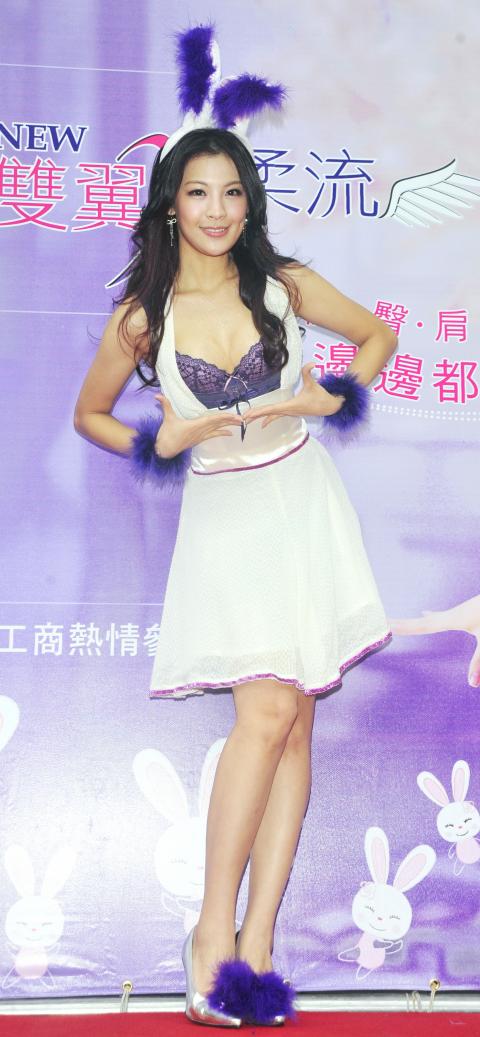The rich and famous can usually be counted on to embarrass themselves for our entertainment, especially with the media already antsy about the way they were treated during the March 22 wedding of Barbie Hsu (徐熙媛, aka Big S) and Chinese restaurateur Wang Xiaofei (汪小菲) last week. At the nuptials, Chinese businesswoman Zhang Lan (張蘭), the mother of the groom, made some expansive claims about how good her connections in China were, claiming close ties with businessman Wang Jianlin (王健林), whose Wanda Group (萬達集團) owns the Sanya Sheraton Hotel where the wedding took place.
His son Wang Sicong (王思聰), who is CEO of the financial group, said in an online post that Zhang had never met his father, and while the hotel may have offered discounts for accommodation for the wedding party, it certainly was not free. Fans of Big S have taken to the Internet in defense of their idol, but Zhang and her son haven’t won any points from these accusations of rumormongering.
A number of romantic entanglements were picked up on the celebrity radar over the past week. One involved actress Novia Lin (林若亞) and Edwin Gerard (紀亞文). Lin has strenuously denied any connection with Gerard, a Chinese American male model eight years her junior, but the intrepid paparazzi of Next Magazine caught them on camera this week holding hands and sharing an umbrella. These steamy revelations of public intimacy have led to all kinds of speculation that the 34-year-old actress might be casting off her previously demure facade for something a little more titillating. She is currently promoting the Golden Bell Award-nominated television soap Shan Huen (閃昏), in which she plays a forceful woman with a fondness for sadomasochistic sex, and has also started modeling lingerie.

Photo: Taipei Times
Another romantic entanglement to make the pages of Next Magazine was the seemingly surreptitious meeting between actress Shu Qi (舒淇) and Eddie Peng (彭于晏), who has been quoted as having described Shu as “a goddess.” Shu should have headed back to Shenzhen from the Maldives after attending the March 26 wedding of good friend Kelly Lin (林熙蕾), but she took a detour via Taipei, where she met Peng at the well-known night spot Fucking Place (操場).
Numerous friends and colleagues were there as well, but Next Magazine suggests that there may be something a little more to the meeting than a casual get together. The venue’s name may have sent paparazzi into a frenzy, but the two actors have a long-standing friendship, and while there have been rumors of possible romantic involvement, the sighting last week adds little substance to the case the gossip rags are trying to build.
In other news, Jay Chou (周杰倫) may have reason to congratulate himself. Although he endured many insults as a result of his participation in a subsidiary role in The Green Hornet superhero movie, it got him noticed among young Americans.
Pop Stop felt a rush of patriotic excitement when it saw rumors that Chou had been nominated for the MTV Music Awards. Closer investigation revealed that he has been “nominated to be nominated,” and has joined the likes of Aaron Johnson from Kick-Ass, Arnie Hammer from The Social Network and Alex Pettyfer from I Am Number Four as eligible nominees for the 2011 “Best Male Breakout Star.” Other accolades include his appearance on the nomination list for Time magazine’s list of the world’s most influential people. He’s clearly on the road to becoming Taiwan’s first international star of stage and screen.

Towering high above Taiwan’s capital city at 508 meters, Taipei 101 dominates the skyline. The earthquake-proof skyscraper of steel and glass has captured the imagination of professional rock climber Alex Honnold for more than a decade. Tomorrow morning, he will climb it in his signature free solo style — without ropes or protective equipment. And Netflix will broadcast it — live. The event’s announcement has drawn both excitement and trepidation, as well as some concerns over the ethical implications of attempting such a high-risk endeavor on live broadcast. Many have questioned Honnold’s desire to continues his free-solo climbs now that he’s a

As Taiwan’s second most populous city, Taichung looms large in the electoral map. Taiwanese political commentators describe it — along with neighboring Changhua County — as Taiwan’s “swing states” (搖擺州), which is a curious direct borrowing from American election terminology. In the early post-Martial Law era, Taichung was referred to as a “desert of democracy” because while the Democratic Progressive Party (DPP) was winning elections in the north and south, Taichung remained staunchly loyal to the Chinese Nationalist Party (KMT). That changed over time, but in both Changhua and Taichung, the DPP still suffers from a “one-term curse,” with the

Jan. 26 to Feb. 1 Nearly 90 years after it was last recorded, the Basay language was taught in a classroom for the first time in September last year. Over the following three months, students learned its sounds along with the customs and folktales of the Ketagalan people, who once spoke it across northern Taiwan. Although each Ketagalan settlement had its own language, Basay functioned as a common trade language. By the late 19th century, it had largely fallen out of daily use as speakers shifted to Hoklo (commonly known as Taiwanese), surviving only in fragments remembered by the elderly. In

Lines between cop and criminal get murky in Joe Carnahan’s The Rip, a crime thriller set across one foggy Miami night, starring Matt Damon and Ben Affleck. Damon and Affleck, of course, are so closely associated with Boston — most recently they produced the 2024 heist movie The Instigators there — that a detour to South Florida puts them, a little awkwardly, in an entirely different movie landscape. This is Miami Vice territory or Elmore Leonard Land, not Southie or The Town. In The Rip, they play Miami narcotics officers who come upon a cartel stash house that Lt. Dane Dumars (Damon)